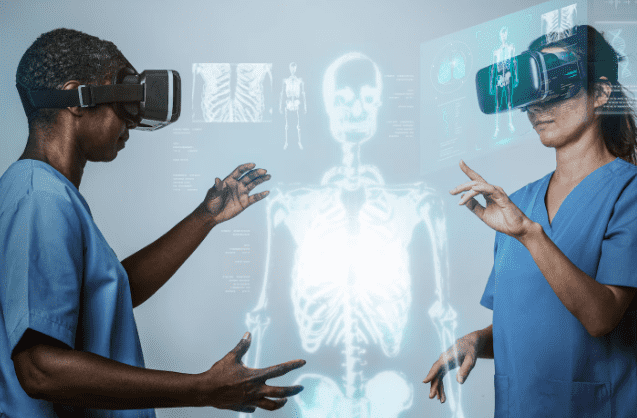AI in Healthcare today is functioning as an end-to-end act of change for the Healthcare industry in the United States. Furthermore, from hospitals to clinics, AI in Healthcare enables medical professionals to make accurate diagnoses and treatment plans while also significantly easing hospital operations. Consequently, alongside digital health, American patients enjoy faster, more reliable, and efficient medical services.
The U. S. Healthcare industry is under heavy usage of AI. This states that it is of utmost importance for medical professionals, investors, and policymakers alike to understand how AI is impacting Healthcare. Hence, this guide shall review the concept of AI in Healthcare, its applications, emerging trends, and future opportunities for the U. S. market in the year 2025.
What Is AI in Healthcare?
AI in Healthcare pertains to the application of various AI technologies like machine learning, natural language processing, and predictive analytics to heal, serve patients, and ensure operational efficiency. For example, AI tools take in thousands of medical records and identify patterns that help predict a disease prior to the manifestation of any symptoms. AI tools can also be put to use in various administrative tasks, minimizing the chances of human error so that the medical staff has more time for the patient.
In simple terms, AI in Healthcare is not just about techniques. It really is about bettering outcomes for the respective healthcare provider and patient.
Why the United States Leads in AI Healthcare Adoption
The United States holds the forefront in AI in Healthcare adoption for many reasons:
- Advanced Infrastructure: U. S. hospitals and research institutions have access to cutting-edge technology and high-quality medical datasets. As a result, AI algorithms can be trained and tested more effectively than in many other countries.
- Investment in Innovation: Venture capital and government funding in AI-driven health tech are gaining ground and, therefore, stimulating startups and established firms to develop solutions for public and private healthcare systems.
- Patient Demand: Across the U. S., patients increasingly expect personalized care, fast diagnostics, and digital health solutions. Also, telemedicine and health apps have acquainted most people with technology-driven care.
- Regulatory Support: Regulatory frameworks such as the FDA’s AI/ML-Based Software guidance ensure safety while fostering innovation. Therefore, companies can confidently offer AI solutions while complying with the United States healthcare regulations.
Key Applications of AI in Healthcare
The very AI landscape looks like it is transforming the American healthcare arena, offering various implications for the core area. We list here a few of the most important options:
- Medical Imaging and Diagnosis
AI imaging tools actively detect abnormalities in X-rays, MRIs, or CT scans with utmost precision. For instance, certain AI algorithms help radiologists identify early cancer manifestations that human eyes cannot see. By making diagnoses faster, AI enables doctors to provide quicker treatments and achieve better patient outcomes.
- Predictive Analytics for Patient Care
By analyzing electronic health records (EHRs), AI can predict which patients face risks for chronic conditions such as diabetes or heart disease. Consequently, healthcare providers can implement precautionary measures sooner, reduce hospital admissions, and ensure higher levels of patient health.
- Drug Discovery and Development
AI helps in drug discovery by analyzing molecular structures and predicting drug properties and likely side effects. The faster such inventive drugs can be claimed by the pharmaceutical companies of the U. S., the better, and it should be done efficiently.
- Virtual Health Assistants
AI-powered chatbots and virtual assistants help patients schedule appointments, remember to take medicine, and answer medical questions. Consequently, this allows healthcare providers to work on improving patient engagement while reducing the burden of administrative tasks.
- Personalized Medicine
Moreover, it permits treatments tailored to analyze genetics, lifestyle choices, and medical history. As a result, such treatments are not only more likely to be successful but also less likely to cause complications.
- Robotic Surgery and Automation
Robotic surgical systems, enabled by AI, provide precision beyond human capability. The AI monitors patient vitals during the procedure, thereby reducing risk and ensuring better surgical outcomes.

Emerging Trends in AI Healthcare in 2025
The ceaselessly changing landscape of AI in Healthcare is evolving continuously. The following trends will dominate the market in the U. S. in 2025:
- Integration with Telemedicine: Using AI-driven platforms for virtual consultation and remote monitoring of patients will help in making healthcare accessible in far-flung rural areas, too.
- Wearable Devices with AI: Smartwatches and fitness trackers will increasingly be used to monitor vital signs and, in real time, predict the onset of adverse health issues so that patients can use these insights to improve their health.
- Natural Language Processing (NLP) for Medical Records: NLP will extract insights faster from unstructured medical data to improve decision efficiency.
- AI Mental Health: Chatbots, mood trackers, and prediction models will assist with treatment for depression, anxiety, and other mental health issues.
- Interoperable AI Systems: The AI platforms themselves will increasingly be integrated, sweeping hospitals, labs, and insurance providers with initiatives to enhance data sharing and patient care coordination.
Challenges of AI in Healthcare
Despite its enormous potential, AI in Healthcare is also faced by several challenges in the U.S.A.:
- Data Privacy and Security: Sensitive medical information handling must strictly comply with HIPAA and other privacy regulations.
- Bias in AI Models: Algorithms trained over biased datasets result in flawed, unfair, or inaccurate predictions. Therefore, much thought must go into validation and then constant updating.
- High Cost of Implementation: Breakthrough AI solutions require enormous investment in hardware/software plus training.
- Resistance to Change: An AI-hesitant healthcare professional is essentially an opportunity foregone. With proper training, support, and integration of cultures, this barrier can be overcome.
How to Leverage AI in Healthcare as a Business Opportunity
The AI in Healthcare term is not simply a clinical phrase-their U. S. commercial nexus is booming.
- Startup Innovation: Build AI for diagnostic assessments, patient engagement, or hospital management. Meanwhile, the niche AI application draws venture capitalist interest.
- Working directly with Hospitals: Association with medical institutions for the implementation of AI-driven solutions that enhance their efficiency and patient care.
- AI-Health Apps: Apps for management of chronic diseases, mental health support, or fitness tracking can, therefore, go to millions of U. S. users.
- Integration with Telehealth Platforms: Bring AI and telehealth together to present services for automated triage, virtual assistants, and predictive analytics.
What the Future Has in Store for AI in Healthcare
The future of AI in healthcare in the United States inspires bright hopes. As technology advances, doctors, nurses, and researchers will increasingly rely on AI as an indispensable tool. Predictive analysis will enable preventive care, virtual assistants will actively engage patients, and personalized treatment will set the new standard of care.
Moreover, as government initiatives actively foster AI innovation and the general population increasingly accepts digital health solutions, the United States is set to lead the world in AI-powered healthcare solutions by 2025 and beyond.
Conclusion
Hence, AI in Healthcare is revolutionizing the U. S. medical industry by improving diagnostics, customizing treatment, and enhancing operations. It opens up immense opportunities for innovation, investment, as well as better patient outcomes.
Therefore, whether you are an established professional in the healthcare sector, an entrepreneur, or an investor, you must learn and integrate the ABCs of AI into your practice next year. By using AI wisely, you can make U.S. healthcare systems more efficient, accessible, and patient-focused, save lives, and improve the quality of care.
